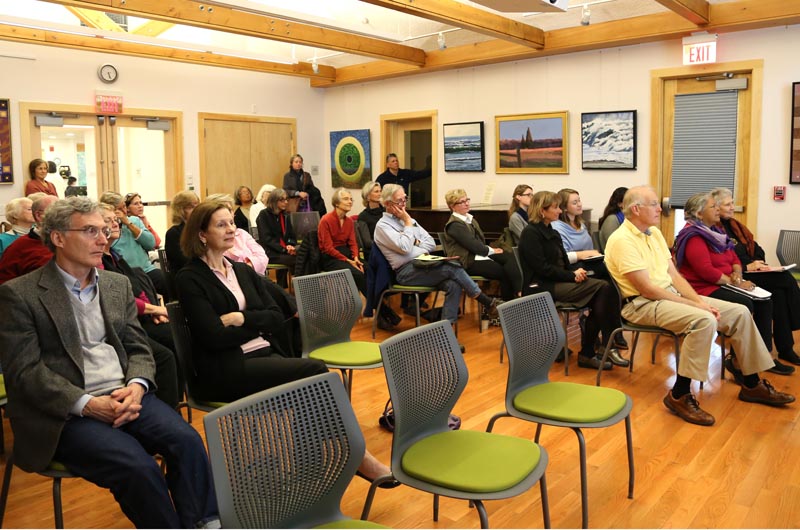In a study recently completed by this year’s Rural Scholars program, neglect by a caregiver and self neglect were cited as the top two types of abuse facing the Vineyard elder population.
Five scholars from the University of Massachusetts Medical School and the Graduate School of Nursing in Worcester spent the past two weeks on the Island studying elder care and services. On Thursday evening they presented their findings at the West Tisbury library.
“One thing that came up again and again is that a lot of seniors are living very isolated here,” said student Elizabeth Rosen. “The number of times that I heard long dirt road and dark neighborhoods . . . I lost count.”
“The elders aren’t realizing that they aren’t eating appropriately or doing their daily cares appropriately,” added Adrienne Pompeian.
The study was sponsored by the Dukes County Health Council and Connect to End Violence, and is a requirement for a Determinants in Health course the students take during their second year of study. On the Island, the scholars conducted 37 interviews and focus groups with a variety of service providers as part of their research.
Connect program director Jennifer Neary helped facilitate the research.
“Our proposal for the project was to focus on the scope of elder abuse in our community, as well as self-isolation, and look at the prevention of and response to issues of elder abuse and neglect,” Ms. Neary said.
The students were given a binder of information and survey questions that served as the framework for their research.
“They’ve been very supportive but also given us our freedom to see what we find,” said nurse practitioner student Ben Alfred.
With the elder population projected to grow 160.2 per cent in Dukes County between the years of 2000 to 2020, the study is a timely one.
“As the elderly population increases, unfortunately the reported cases of elder abuse and neglect have increased as well,” said Margaret Donovan. “Where will we be in the year 2020 if a change is not made?”
Thursday’s presentation offered information, discoveries and suggestions on how to improve elder care on the Island.
“While elder abuse is by no means specific to Dukes County, some aspects of life within Dukes County make the problem of elder abuse unique, as compared to the rest of the state,” said Aimee Kobjack.
Examples include lack of financial resources with respect to cost of living, lack of year-round job opportunities, geographical location, transportation and health care services, including mental health services.
“Mental health is a huge determinant that can lead to neglect and elder mistreatment,” said Ms. Kobjack.
Another aspect unique to the Island that the scholars kept hearing about is “Yankee stubbornness.”
“A lot of these residents have been on the Island their entire life and they are used to being in their home and they may not realize that staying in their home is detrimental to their health,” said Ms. Kobjack.
Housing options were another aspect that the students found to be a challenge for the Island’s growing elder population.
“There are 4,000 elders on this Island and when you count up the beds there are 263, so if there isn’t enough for the elders now, when the population expands in the coming years and they can’t stay in their homes, where are they supposed to go?” said Ms. Kobjack.
After presenting the challenges faced by elders, the students discussed the process of mandated reporting with respect to elder abuse. They recommended increasing awareness and training about reporting processes so that organizations, services and community members could appropriately identify and report cases of abuse.
“We feel like there is a lot of abuse going on, but the numbers aren’t matching up with the cases reported,” said Ms. Pompeian.
The scholars suggested that the discrepancy may be attributed to the fact that the community tries to solve the problem on its own, and also that there may be a hesitancy to report it because of how close-knit the community is.
The scholars also suggested four main areas of improvement: caregiver support in the form of support groups, skill building, training and an educational handbook for both on and off-Island caregivers. They suggested reviving the Gatekeepers model to get people in the community involved and trained in elder abuse, and encouraging students in the schools to become more involved with the education and awareness about elder needs.
After finding an overlap in services and requests for funding, the group suggested more communication between agencies and streamlining funding requests so that agencies wouldn’t be competing for the same resources.
“There are a lot of services in place here and it’s just a matter of getting them to run more efficiently and effectively together, rather than there being an absence of services,” said Ms. Rosen.
The students were all appreciative of their time on the Vineyard, and said their work here would inform the rest of their careers as health providers.
“It’s been an incredible 10 to 12 days with you here, and for us it’s certainly given us a new way to look at health care,” said Mr. Alfred. “Moving forward, we are definitely going to make sure to advocate for these resources and advocate for our patients to use them.”
From meeting with focus groups, interviewing service providers and attending dinners hosted at Islander’s homes, the experience gave the group new insights on the Island, a place many of the students had never visited.
“A lot of us, I think, have this fantasized idea about what Martha’s Vineyard is from what the media says,” said Ms. Pompeian. “I think we have a better understanding of the other side.”
They also have a better understanding of Island hospitality.
“Can you just tell whoever left us apples, zucchini bread and cider on our doorstep, thank you?” said Ms. Rosen.








Comments (1)
Comments
Comment policy »